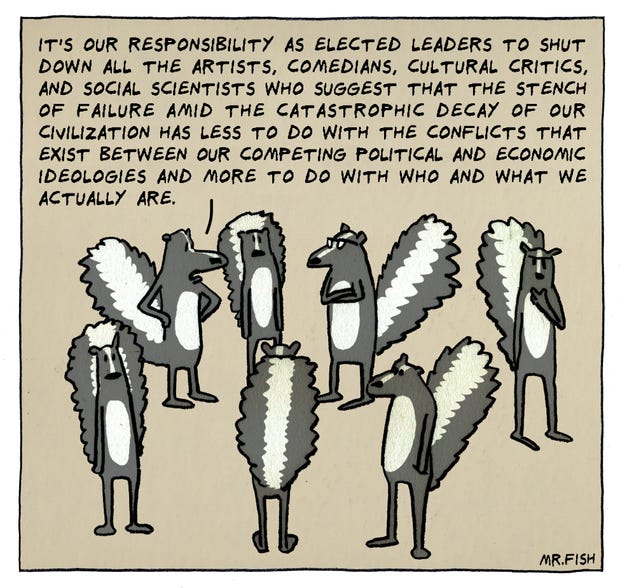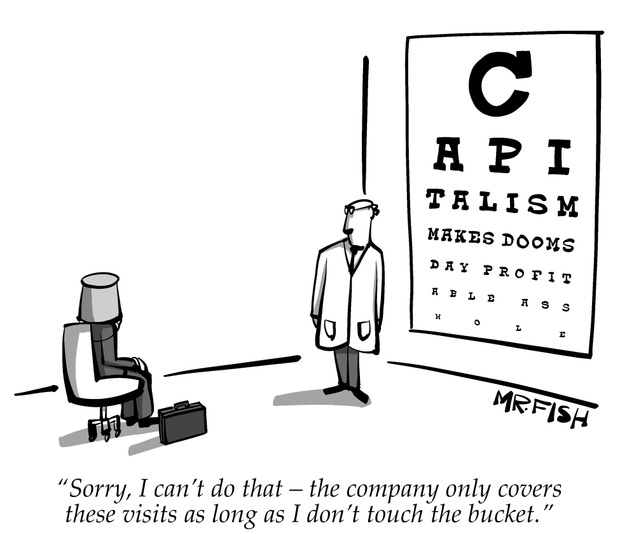Earth Shattering
The end of Trump, the GOP and unless we act wisely, our precious spaceship Earth
“There is a price to pay for speaking the truth. There is a bigger price for living a lie.” - Cornel West
In her December 3, 2022 Letters from an American on Substack.com, Heather Cox Richardson documented the “outrageous statements” made by former president Donald Trump, still at the time the “presumptive presidential nominee for the Republican Party in 2024,” about overthrowing our extant constitutional government and installing himself as dictator. Then, on December 4, 2022, she further reported that the GOP was OK with Trump’s rants since no Republican Party leaders or legislators, save one, condemned Trump’s blatant act of treason. Richardson aptly characterized the Republicans’ wall of silence about Trump’s delusional assaults on the Constitution as “earth shattering.” “The leader of the Republican Party has called for ‘the termination of all rules, regulations, and articles, even those found in the Constitution,’” Richardson wrote, “and party leaders are silent.” The fact that Trump is openly violating the constitutional oath he swore to uphold as an elected official speaks volumes about the GOP’s acceptance of him as its presidential candidate in 2024.
That Richardson’s report about these egregious assaults on the Constitution and the G0P leadership’s wall of silence are shocking and dismaying to most Americans, but apparently not in sufficient measure to get a peep out of the GOP, is another indicator of the “earth shattering” times we now live in. Hello? Trump is the 2024 GOP pick to run for president of the United States and party leaders failed to react after he publicly advocated the termination of the laws of the land? The news is certainly shocking, but not necessarily surprising to anyone familiar with Trump’s boisterous mendacity, but Richardson’s characterization of the former president’s comments as “earth-shattering” portends serious implications for America’s political future, depending on how events unfold.
In my comment about her post I noted that what is equally “earth shattering” is the GOP’s abject denial of global warming, another indication that the “Trumplitized” Grand Old Party is unfit to govern. Fortunately, in the matter of Trump’s transgressions against the Constitution and the laws of the land, it appears that the rule of law will prevail, greatly abetted by the majority of the American people who still love liberty more than the narcissistic demands of a delirious former president when they rose to the occasion to defend democracy, voting against the GOP’s selection of candidates in the midterm elections. The voice of the people, so eloquently articulated in the annals of Letters from an American over the years and amplified by the legions of savvy readers who responded to the threat to freedom in their comments and votes, is still loud enough to make a difference. Now, if We, the People can meet the challenge posed by climate change with the same righteous concern raised on behalf of democracy and the common good that is bringing the errant Trump and his legions to justice, we may actually succeed in saving our precious planet.
The strategies and tactics for creating and sustaining a sustainable world are nothing new; the path has been clearly marked by the great sages of the past. In her book Sacred Nature, Karen Armstrong articulates the essential principles for living in harmony with the natural world passed on from generation to generation throughout the ages. “A healthy family life, good government and a sound understanding of worldly affairs are rooted in a profound appreciation of nature because the natural world is our home and it affects everything we think and do. Today, we too must realize that our current efforts to devise effective policies to save our planet will fail, unless our priorities are right and our knowledge, our government and our spirituality are all firmly grounded in nature.” (italics mine)
Unfortunately, in view of the lack of concern for significant ecological issues such as biodiversity on the part of US policy makers, that happy outcome is in dire jeopardy. George Monbiot, writing in The Guardian, December 9, 2022, reports that the United States is one of two rogue players among the 198 global states meeting to discuss the world’s ecological crisis that has refused to ratify the Montreal convention on biological diversity. The other one is the Vatican. “Through its undemocratic dominance of global governance,” writes Monbiot, “the US makes the rules, to a greater extent than any other state. It also does more than any other to prevent both their implementation and their enforcement. Its refusal to ratify treaties such as the convention on biological diversity provides other nations with a permanent excuse to participate in name only.”
Monbiot sees the US refusal as another missed opportunity to break a downward political spiral leading to dire ecological consequences. “Thanks to such failures of care over many years, we now approach multiple drastic decision points,” contends Monbiot,“at which governments must either implement changes in months that should have happened over decades, or watch crucial components of civic life collapse, including the most important of all: a habitable planet.” The insular stance of American industry on the climate change issue only exacerbates government inertia, adding more “drastic decision points” to the list of failures. To wit: In her December 11, 2022 Letters from an American report about the rupture in The Keystone Pipeline that spilled 14,000 barrels of oil, Heather Cox Richardson summed up the attitude of the fossil fuel industry regarding the damage their products inflict on the environment. “As part of their yearlong investigation of the fossil fuel industry,” Richardson writes, “the House Committee on Oversight and Reform released documents from executives at major oil companies revealing that they recognize that their products are creating a climate emergency, but that they have no real plans for changing course.”
In truth, the problem is much worse than a lack of planning. According to Tom Dispatch editor Tom Engelhardt, the fossil fuel CEOs and their agents are what he calls “terraists,” a play on the word terrorist coined by Engelhardt’s friend, journalist Nick Turse. “Those who run the giant energy corporations knew perfectly well what was going on and could, of course, have read about it in the papers like the rest of us,” Engelhardt writes. “And what did they do? They put their money into funding think tanks, politicians, foundations, and activists intent on emphasizing ‘doubts’ about science (since it couldn’t actually be refuted); they and their allies energetically promoted what came to be known as climate denialism…” “Call it not irony, if you will, or call it a nightmare,” concludes Engelhardt, “but Big Oil evidently has no qualms about making its next set of profits directly off melting the planet.”
To get a better picture of the scope of the problem here’s some salient points about the climate emergency from Elizabeth Kolbert’s must-read article in The New Yorker, November 28, 2022, A Vast Experiment: The climate crisis from A to Z. Noting the chronic lack of action to address the problem in the years since physicist Svante Arrhenius’s discovery in 1894 that carbon dioxide was the culprit, Kolbert writes that despite years of hand wringing and lip service, emissions have continued to rise. “In the past thirty years, humans have added as much CO2 to the atmosphere as they did in the previous thirty thousand,” she writes before posing the crucial question, “What’s the matter here? Why has so little progress been made on climate change, even as the dangers have become more apparent?” As Tom Engelhardt makes clear in his article, measures to address it simply interfere with the profits of Big Oil. Kolbert amplifies Englehardt’s point stating that “just in the first quarter of 2022, twenty-five of the world’s largest oil-and-gas producers announced profits of close to a hundred billion dollars—and still more money to be made by burning fossil fuels to make stuff to sell, from sunglasses to steel girders.” This fact brings the global capitalist economic system sharply into focus along with the realization that as anthropologist Jason Hickel states in Kolbert’s piece, “Climate change can’t be dealt with using the tools of capitalism, because it is a product of capitalism. It can be dealt with only by throwing off capitalism in favor of something else—a system aimed not at growth, but at ‘degrowth.’”
In her analysis of the specific causes, Kolbert reasons that it all comes down to kilowatts and in view of the egregious level of kilowatts Americans consume everyday, the US clearly has a responsibility to lead the way in reversing course and leading the way forward in these matters. “Owing to this every-day-is-Christmas level of consumption, “ writes Kolbert, “annual emissions in the U.S. run to sixteen metric tons of CO2 per person. Americans don’t have the world’s highest per-capita emissions—that dubious honor goes to Kuwaitis and Qataris—but we’re up there.”
The lack of meaningful collective global action on the climate warming front only increases the potential for consequences synonymous with Heather Cox Richardson’s assessment of Trump’s “earth shattering” repudiation of the Constitution: shocking, momentous, portentous, epic-making, tectonic, seismic, and apocalyptic, just to name a few of the polite words used to describe the anticipated outcomes. The climate crisis, after all, is job one on the agenda for humanity, the issue Professor Paul Street calls, “The worst of the ‘four horsemen’—the biggest issue of our or any time. There is no public health, demilitarization, democracy, social justice, and rule of law on a dead planet.” Street also rightly identifies the fundamental cause of humanity’s dire predicament as “the accumulation-mad system of class rule called capitalism. Homo sapiens will be stuck on this treadmill of death unless and until it fights through and past all its real but lethal polarizations of race, gender, ethnicity, sexual identity, nationality, culture, and religion/irreligion to achieve the ultimately required polarization—the one that fits all decent humanity against not merely the capitalist class but against the underlying material base and broad political and ideological superstructure of the capitalist system. It’s not about getting revenge against the evil Dickensian Gradgrinds, Krupps, Rockefeller’s, Gates, and Musks and it’s not about getting ten-cent rides on the 1960s Moscow subway; it’s about ending and replacing their system with a new revolutionary socialist order that sweeps not merely their wealth and power, but also their beliefs and values and indeed the whole ideological system that sustains their exterminist rule into the dustbin of history.”
Meanwhile, it looks like the fascist demagogue Trump might soon be prosecuted for his crimes. As he desperately watches his star fade into oblivion, he has resorted to grifter’s tactics to keep his name in lights. The Donald is now hawking $99 NFTs, (Non Fundable Tokens) to raise money for his run for office, a cheap ploy reminiscent of Republican Dr. Oz’s lowbrow dissemination of postcards during his run for the Senate in the 2022 midterms, promising to make American mens’ peckers “longer and thicker.” Despite the inane distractions of the GOP, a new generation of Americans seems to be waking up to the realization that democracy cannot survive without active vigilance on the part of the citizenry. It’s also clear now to a significant number of people that the two-party political circus in Washington is hopelessly corrupt, making major systemic change an imperative for our survival. As Patagonia CEO Yvon Chouinard points out, real change can only happen from the bottom up, which is clearly not the direction things are moving in when implemented by the autocratic, top-down, corporatized oligarchy now in place posing as an authentic democracy. A case in point is the recent decision by president Biden and company to deny the nation’s railroad workers the right to strike over workplace injustices, including the provision of paid sick leave. While members of congress have the benefit of unlimited time off for illness, the powers that be decided that railroad union workers don’t deserve the same privilege.
In my comments about this “portentous” hypocritical circumstance on Substack, I noted that railroad management has apparently been affected by the “stupid virus,” just like the management ranks of most American corporations ruled by the predatory, capitalist fist. The apt word to describe the treatment of railroad workers is “abuse,” and if it continues, it will mean “momentous” repercussions for future labor-management relations. American railroad honchos no doubt think of themselves as “enlightened” because of their glorious earnings numbers, but down the road when the system collapses they will be held accountable for their inequitable labor policies. In order to limit the damage already done to the morale of the rank and file, I suggest a thorough reading of Peter F. Drucker’s books on management, starting with People and Performance. The current management methods deployed in the nation’s railroads may serve the corporate bottom line well, but in the end the financial gains for the investors at the top of the economic pyramid will be tainted by the resentment of the workforce that made all those profits possible in the first place. “Most of what we call management consists of making it difficult for people to get their work done,” Drucker famously stated, aptly describing the situation, not only in this country’s railroad industry today, but across the entire corporate management sector.
Whew! Contemplating these banalities without imagining an alternative is a gruesome, Sisyphusian exercise. So in the face of government subsidies amounting to $1.8 trillion annually that now support ecosystem-damaging industries, as well as carbon and biodiversity offsets that amount to nothing more than corporate scams, and global conferences on climate change that continue to lead nowhere, what’s the solution? In her New Yorker piece, Elizabeth Kolbert quotes a statement by European researchers published in the journal Climatic Change that might at least spark better communications about the problem. “Narratives,” the researchers write, “are socially controlled ‘stories’ that make sense of events thereby lending direction to human action.” Well said, but it’s important to remember that the value of the action taken depends on the truth of the narratives, making the prospect of confronting the issue wisely more challenging than ever before in the polarized world we live in today.
After all of her extensive, evidence-based investigations into the matter of global warming, Kolbert’s conclusions are sobering. “Climate change isn’t a problem that can be solved by summoning the ‘will,’ she writes. “It isn’t a problem that can be ‘fixed’ or ‘conquered,’ though these words are often used. It isn’t going to have a happy ending, or a win-win ending, or, on a human timescale, any ending at all. Whatever we might want to believe about our future, there are limits, and we are up against them.” With those words, Kolbert opens the door for some people to despair over the fate of Homo sapiens, the “wise apes” we have imagined ourselves to be. But as she also writes, “Despair is unproductive. It is also a sin,” a statement that keeps the quest for solutions alive for those who still care about their fellow beings and the precious planet they now inhabit.
At this watershed moment in the climate emergency drama, enter stage left: Mr. Fish, “the joyful nuisance.” At least that’s how he described his role in a recent Eventbrite symposium called Art 27 Human Rights Day 2022. If I’m perceiving his intentions rightly, he’s suggesting that the idea of developing narratives as recommended by the researchers in Climatic Change, is a good one, agreeing that the stories we share with each other about our lives can be powerful facilitators of connection and understanding. But Mr. Fish also cautions that how a particular idea for a solution gets framed also raises the question, who is controlling the narrative? Who is framing the parameters of the conversations we have about these issues? Who is writing the script? Is the issue being distorted by prejudice and self interest or does it arise from a source of integrity? Is the structure of the narrative based on delusional bullshit manufactured by a nefarious dominating authoritarian source, or does it resonate with what Abraham Lincoln called the “better angels of our natures,” that psychic well of universal truth and justice that we all share in our hearts and minds as human beings?
After Descartes and his ilk set the stage for the exploitation of the natural environment by denying its sacred dimension and accessing its value purely in terms of the cash nexus, it’s been a downhill ride to Hell for Pacha Mama ever since. Thinking the matter through inspired by Mr. Fish, it’s clear that the solution to the climate emergency begins with how the debate gets framed and recognizing that when it’s framed in Cartesian terms by globalist governments and corporate- controlled capitalist hierarchies, the result is the inertia and gridlock we suffer today. As Mr. Fish states the case, “So long as economics determines our value in society, we’re in deep trouble.” To set things right, he deploys his art as a means of changing the narrative in a joyful way. Why use art? If I’m reading him right, Mr. Fish believes that doing the right thing is about developing a language of optimism, a dialect of hope forged by the power of art which gives us the opportunity to tell each other stories as we celebrate the gift of life and appreciate and care for each other. Each of us brings to these stories our own sense of justice and ideas about how to gauge our relationships with the global family of mankind to which we all belong. Art is a means of connecting and learning about each other and a way of reminding us that we’re all vulnerable human beings in need of the truth that will enable us to avoid paying the “bigger price for living a lie,” as the great philosopher and public intellectual Cornel West puts it in the prelude quote.
“The path to success,” says Mr. Fish, “involves building up the callouses of resistance and maintaining our energy level and endurance to get through it all.” Mr. Fish’s work inspires and encourages us to frame our view of the world with our hearts as well as our heads from the universal perspective of our connection to each other and our shared humanity. In the context of the climate crisis, that means letting the evidence that defines the well being of the planet be the main consideration in our efforts to frame a rational response. The role of the “joyful nuisance” is to keep the evidence in focus through art as a means of thwarting the oppressive forces that attempt to deny or subvert the truth. Mr. Fish’s work fulfills that mission beautifully. His tools for speaking truth to power include ridicule, humor, satire, investigative journalism, civil disobedience when necessary, and whatever other creative, non-violent means are deemed appropriate to keep humanity’s long, slow train to the Promised Land rolling along on the right track.










